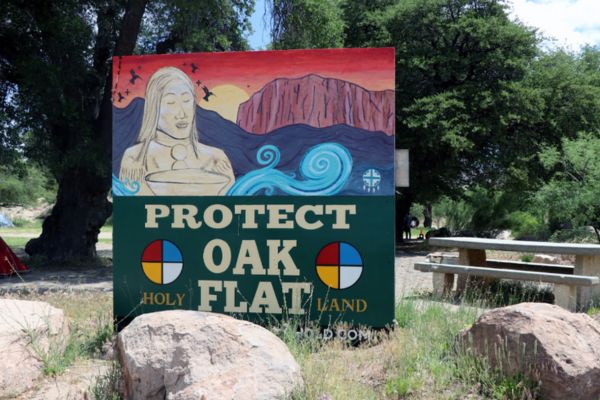
- Details
- By Native News Online Staff
In a 94-page decision released on Friday, August 15, a federal judge in Arizona rejected the most recent attempt by the San Carlos Apache Tribe, environmental groups, and other plaintiffs to block the federal government from transferring land from the U.S. Forest Service to Resolution Copper.
The land commonly known as Oak Flat is known to the Apache as Chi’chil Bildagoteel—a sacred site to tribal members, known for its ancient oak groves and traditional plants that are vital to Apache religious practices.
Federal District Court Judge Dominic W. Lanza recognized that the planned copper mine would destroy one of the Apache people's most sacred sites, pose serious environmental risks, and consume vast amounts of water amid Arizona’s ongoing historic drought.
However, he concluded that the plaintiffs had not presented a strong enough legal case to warrant halting the project.
Lanza noted that the U.S. Supreme Court's decision in May to decline hearing Apache Stronghold’s appeal played a role in shaping his ruling. He pointed out that the high court had refused to take up the case even though it involved claims that, in his view, raised more substantial and compelling legal questions than those presented in the current lawsuit.
The San Carlos Apache Tribe, Apache Stronghold, and other plaintiffs have spent years in court battling to protect Chi’chil Bildagoteel.
With the decision, the land transfer could occur as soon as this coming week on August 19.
The planned land exchange would hand over 2,422 acres of Tonto National Forest, including Oak Flat, or Chi’chil Biłdagoteel in Apache, to Resolution Copper, a mining venture jointly owned by London-based Rio Tinto (55%) and Australian firm BHP (45%).
The area, 70 miles east of Phoenix, is a sacred ceremonial site for the Apache and listed in the National Register of Historic Places as a Traditional Cultural Property.
Adding to concerns is the international ownership structure of Resolution Copper. Rio Tinto’s largest investor is the Chinese state-owned Aluminum Corporation of China, which holds a 14.6% stake.
More Stories Like This
Gwich'in Tribal Governments Submit Comments Challenging Fish and Wildlife Service's Inadequate Environmental Review of Arctic Refuge Snow RoadRappahannock Tribe Challenges 9M-Gallon Water Plan
Feds release draft long-term plans for Colorado River management
Apache Leader Walks 60 Miles to Court Hearing That Will Decide Fate of Sacred Oak Flat
Rappahannock Tribe Raises Sovereignty and Environmental Concerns Over Caroline County Water Permit
Help us defend tribal sovereignty.
At Native News Online, our mission is rooted in telling the stories that strengthen sovereignty and uplift Indigenous voices — not just at year’s end, but every single day.
Because of your generosity last year, we were able to keep our reporters on the ground in tribal communities, at national gatherings and in the halls of Congress — covering the issues that matter most to Indian Country: sovereignty, culture, education, health and economic opportunity.
That support sustained us through a tough year in 2025. Now, as we look to the year ahead, we need your help right now to ensure warrior journalism remains strong — reporting that defends tribal sovereignty, amplifies Native truth, and holds power accountable.
 The stakes couldn't be higher. Your support keeps Native voices heard, Native stories told and Native sovereignty defended.
The stakes couldn't be higher. Your support keeps Native voices heard, Native stories told and Native sovereignty defended.
Stand with Warrior Journalism today.
Levi Rickert (Potawatomi), Editor & Publisher


